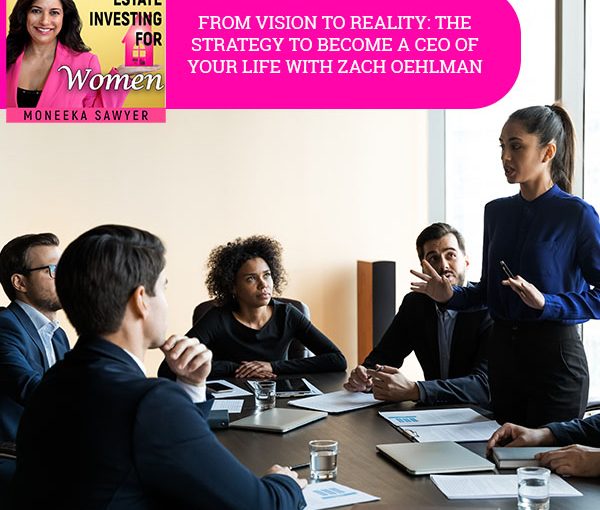10 Ways to Invest in Real Estate for Under $1000
Moneeka Sawyer is often described as one of the most blissful people you will ever meet. She has been investing in Real Estate for over 20 years, so has been through all the different cycles of the market. Still, she has turned $10,000 into over $5,000,000, working only 5-10 hours per MONTH with very little stress.
While building her multi-million dollar business, she has traveled to over 55 countries, dances every single day, supports causes that are important to her, and spends lots of time with her husband of over 20 years.
She is the international best-selling author of the multiple award-winning books “Choose Bliss: The Power and Practice of Joy and Contentment” and “Real Estate Investing for Women: Expert Conversations to Increase Wealth and Happiness the Blissful Way.”
Moneeka has been featured on stages including Carnegie Hall and Nasdaq, radio, podcasts such as Achieve Your Goals with Hal Elrod, and TV stations including ABC, CBS, FOX, and the CW, impacting over 150 million people.
From Vision To Reality: The Strategy To Become A CEO Of Your Life With Zach Oehlman – Real Estate For Women

We always want to find bliss, but we have no control over the things around us. How do we do that? How can we control our lives despite the busy day-to-day of business? In this episode, Zach Oehlman, the founder of Valley Investment Club, shares his insights on developing yourself through a Vision To Reality strategy. Zach dives deep into personal development and personal responsibility, particularly in his real estate business. He tells us that when we are changing our life, we must change the context first. When life sucks, we don’t blame life; instead, we must be responsible for how to deal with it and empower ourselves in the process. To find the world of bliss and become the CEO of our lives, tune in to this episode.
—
Watch the episode here
Listen to the podcast here
From Vision To Reality: The Strategy To Become A CEO Of Your Life With Zach Oehlman – Real Estate For Women
Real Estate Investing For Women
I am excited to have you on the show, Zach Oehlman. This is what Zach has to say about himself, “I grew up in a small town in Northwest Indiana and went on to college at Indiana University for Finance and Business. I started a career as an evaluation consultant and became a published author in this industry before starting my own business.
I have spent several years growing multiple businesses and traveling the world with my wife. We own and operate three businesses, a real estate investing community, a software and automation company, and a VA business development company. We find great people with great companies and help them scale themselves out of the day-to-day business.” Zach, welcome to the show. How are you doing?
Blessed and highly favored.
I’m excited to be talking to you. I don’t know if you know this about me, but I personally have traveled to 65 countries. Travel is my deepest passion. Here’s one of the things that happened over the last few years. We know what happened during the pandemic, and that was a different reason, but since I started this show and this business, I haven’t been able to travel. The business has owned me.
You and I were talking about in the green room that it’s time for me to get back to the blissful life that I created. I want to get back to that. I love doing this show. I love serving my ladies, but it’s time for me to pay a little bit of attention to my needs too. I’m excited to be talking to you who’s doing that thing. You’re traveling the world and running businesses remotely, and it’s not taking a huge amount of your time. I’m excited to be talking to you about it. Could you tell us a little bit about your story and how this all started?
Way back when, in the little town of Kouts, Indiana, I’m a farm kid. I didn’t value anything other than being outside. My dad died when I was twelve. I took over the family farm before and after school, but I always had this deep desire to travel the world, help people and make a lot of money. I didn’t know how to do it. I started looking into this world that I wanted to get into. What I found was it takes money. I listened to some of your stuff. It’s like, “Money creates choice.” I love the way you say that. I was like, “I want to learn how to make all the money in the world so I could do whatever I want.”
They said, “Become a business owner or an investor.” Fast forward, I went to college. I took college very seriously. I graduated, from IU with a degree in Finance and Business in 2008. If anyone remembers 2008, that is not a great time to be in the finance market. I sent out 3,500-plus resumes over 3 years. I worked down at the Chicago Board of Trade.
I became a consultant in the valuation industry, six figures a year, every bell and whistle you could think of. I was like, “I made it. Here it is,” and I was miserable. I pulled the curtain out. I got to see the underbelly of this, and I was like, “This is going to be the rest of my life, 60 to 100 hours a week, 2 weeks a year, and high stress. A big error could cost millions of dollars and someone’s going to replace you with that. This isn’t what I wanted.”
A friend invited me down to a meeting and say, “Why don’t you come and check this thing out called real estate?” I was like, “I wanted to do it.” I sat through a presentation. I was super interested. I join their community. I got to work. It took me about eighteen months to do my first deal. I didn’t have any money. I had to borrow the money to get into the training and development program for my mom and I’m thankful for her.
I knew that this was the solution because I tried everything else then I was able to quit my job. We started our own real estate investing community because one of the things I’ve learned is you are a product of the people you hang around. I’m like, “I need to bring the resources to me instead of going and getting them.”
Fast forward, we’ve created a nationwide community of over 1,000 people that are connected to 32,000-plus people. In developing that, there are needs. People need access to capital, software, and all these ancillary services. I wanted to make sure that they were well taken care of, so for some of the more business development companies, I created that because I needed it.
I was paying big bucks to all these consulting firms and third-party people. They weren’t in alignment with the other people. I brought all in-house, learned how to scale businesses, learn how to document the process, and then learn how to put people in that. My big vision was to travel the world, then I had this great opportunity called COVID because I ran an in-person meeting twice a week, with 2 to 300 investors every Wednesday and 100 to 150 investors every Saturday. We had training. We moved all of that online. We had this beautiful apartment in Downtown Phoenix on the twentieth floor we just moved into. We were excited about the nightlife and restaurants, and we were in there for a week, and everything got shut down.
I was like, “What are we going to do?” After about four months of doing Zooms every day, I looked at my wife and said, “We don’t even have to be here.” We went to Hawaii for two months, tested that out, loved it, and didn’t like the time change. We came back. We got some things in order, then we went on a two-year world travel like in Columbia and a bunch of different countries. We go and stay for 2 to 3 months. We work during the week, set up our office, and then on the weekends, we enjoy the fruits of labor. It’s trial and error. Eventually, we figured it out.
What I’d love to share with the people is how we did that because it’s different for everybody. It’s a simplistic process if you’ve been through it. If you haven’t been through it, it’s wild. We ended up making it happen. We came back to the United States. We bought another house. We’re getting that up and ready for our personal flavor, then we’re going to short-term rent that out and head to Asia.
People need to understand what it takes to get started in a business. Could you give us your perspective on that?
There are a couple of perspectives on getting started in a business. I’m an analyst by trade. I used to be the most socially awkward person you could ever see. I would break out in sweats, stutter, and stammer. My mind would go blank. I was not a people person. It still takes something for me to get in front of people. I have to call it forth and be intentional about it. What I’ve learned is there are a lot of people that want to go into business, and they don’t even understand what that means like, “I want to start a business. I want to quit my job.” Even the phrase, “I want to be a real estate investor,” what does that mean? There’s such a simplistic to complex conversation around that.
What I tell the people starting off in business is to go find a great product or service that someone else is already created and then sell it. That is such an entry-level, low-risk, learning time of your life because you don’t have to worry about fulfillment, product creation, and all of that stuff that goes with running and managing a business. There are a lot of moving parts to this. What I tell people is, “Go find something great and learn how to sell it.” Once you make some money and understand the processes of business, selling, and making money, then you can start replacing yourself and moving into that. I tried to move to owning and running a business way too quickly, and I didn’t understand all the other variables of it.

Vision To Reality Strategy: Go find something great and learn how to sell it. Once you make some money and understand the process of business, selling, and making money, you can start replacing yourself and moving into that.
In the context of real estate, what I would tell people is you could do real estate with none of your own money and none of your own credit. It’s very true. Here’s one of the easiest things for people to do. I neglected to do this. I was a high six-figure earner, great credit, and I didn’t use it. I was focused on getting these crazy discounted properties and doing it with none of my own money or credit that I neglected doing the simple thing called, “Go get pre-approved. What can I find off the MLS that cashflows?”
I want to highlight that. Even in reading this blog, a piece of me sometimes feels like I want to apologize to my ladies because there are many cool ideas and things that people bring to this show, and it’s cool to read. It can be a little bit confusing, especially when you’re starting because when you’re starting, you want to start the business with the least moving parts and complications. That is what will get you moving. You want your first steps to be the easy ones to feel good because once you have success, then you have more confidence to do the next step. You’re more willing to work harder too.
First of all, they get confused by all the options. When they finally jump in there, it’s hard that they burn out within the first couple of years and they can’t do the long-term, which in real estate, the money is in the long-term. Dealing with the simplest path, which is getting regular credit and buying something on the MLS, I recommend you make sure it’s your first home because you can put the least amount down.
The loans are the easiest to qualify for. You can get the most money. It’s the lowest rate. All of those things are in your personal resonance. If you want to cashflow it, now you can house hack. Rent out a room, Airbnb, and all of those things. I’ve done it all in my primary resonance because it’s the easiest way to get started, and then, “We did this. What can I do next?” Now there’s room for expansion and learning. It’s fun because you’ve already had success.
At that simplistic level of MLS and using your credit and a realtor, you got the realtor and broker or the finance person guiding you. In this world of real estate investing, it’s fast-paced money and high-risk rehabs. I know you own your own construction company. Rehabbing? Understanding that skillset is a big journey. If you take the opportunity cost of high-interest money and timeline to rehab stuff, they’re probably better off getting out of the gate and buying straight off the MLS.
In the very beginning, you’ve got pros that you get to take advantage of them. You’re getting into the business in the most intuitive way like the way that we all understand. The other thing that’s also interesting about that is you’re getting into the business in a way that your community will support you. You’re not going to hear all the fear factor of everybody saying, “That’s hard. That’s risky.”
People might be saying now because we are afraid of a recession and interest rates have gone up. In general, people understand that it’s a good idea to own a house. Until you’ve built a community of other real estate investors that understand where you’re headed, you’re not going to be dealing with the naysayers in general when you start in this way, which is super helpful not to have to fight that.
I did tell anybody for one year and a half I was doing this because I didn’t have the confidence. I was a six-figure earner college degree. I had the proverbial dream life. Everyone is like, “Why are you wanting to quit that?” I didn’t even tell anybody because I didn’t have the confidence to deal with the naysayers.
You don’t want them pulling you down. This topic is deep and close to my heart. Can you talk about personal development and personal responsibility with regard to your business in real estate?
I’m an analytical guy. I understand discount rate cap rates. I’m a published author in finance. I’m like, “I’m going to make so much money. This is going to be great,” then nothing was happening. I was focused on the tactical and practical side of it. I can do spreadsheets. I’m the numbers guy, but in my bank account, it wasn’t happening. My mentors and the people I hang around are like, “We have a personal development guy coming in this weekend. You need to be at this training.” In my mind, I was like, “What is that? What’s personal development?” It wasn’t even in my vocabulary.
I remember I came to this training and cried for six hours. I was in the front row. It was the first time in my life that I was like, “Here is the door to this room I’ve been trapped in. It’s called personal development.” I signed up for his program. I got his coaching. I went straight to the library and was like, “Do you have any books on personal development?” They looked at me funny and go, “Yes, that whole section over there.” It’s like this whole world that I uncovered.
I’ve never been talked to like this. On one of my first coaching calls, he was very respectful, but I was paying for a guy to help me get through something that I didn’t know what it was. He laid it out like this, and I’m going to paraphrase, “Quit blaming everyone else for your lack of success. You’re at where you’re at because of you, and no one else. Take responsibility for that. Own it. Let’s move forward.” He had a couple more choice words in there. I remember where I was. I was angry. I was like, “I didn’t want to hear that.”
Quit blaming everyone else for your lack of success. You're at where you're at because of you, and no one else. Take responsibility for that. Own it. Let's move forward. Share on XIt was like, “What do you mean that’s my fault.” Five minutes later, I had this breakthrough. I was like, “If it’s my fault, that means I could do something about it. Personal responsibility. I’m responsible. I don’t have to wait for the raises or for someone to offer me deals. I can go out there and hunt instead of waiting for things.” Over time, this concept of personal development and responsibility, anytime something isn’t going right or isn’t going the way I want in my life, I go, “How am I responsible?” and then I can do something about it. I’m constantly in programs. I have coaches that don’t coach me around real estate. It’s all personal development, and there are many different flavors of it.
I wrote a book called Choose Bliss. I talk about the flavor of bliss with regard to everything that I teach. Here’s one of the things that I say over and over again, and people have heard me say it so much that they don’t even hear me say it anymore, “We can’t control what happens outside of us, but we must control what happens inside of us because that’s all we can control.” It’s all we have true access to.
I can see where you’re coming from, and I’ve come from this same place. We’ve got this amazing education. It’s, “You can’t tell me it’s my fault. Do you know who I am? Do you know how smart I am?” I didn’t say how smart I am, but we could. We’ve got these college educations and all of this stuff. The reality is, “Do I know who I am? If I don’t take responsibility for who I am, it doesn’t matter what anybody else thinks, says or what education I’ve got because that education doesn’t mean anything unless I am utilizing it for what I want in my life.” In my book, I have a whole chapter about 100% responsibility.
If people took personal responsibility, we would have a different world.
If people took personal responsibility, we would have a different world. Share on XYou’re not blaming people politically, the recession, your boss, your children, or your spouse. You’re taking responsibility for how you’re responding to these situations. From that book, that is the chapter that makes people the most upset. I get emails on this all the time. For instance, I’ve had horrible things happen to me, “Are you responsible for what that guy did to you?” “I’m not responsible for what that guy did to me, but I am responsible for how I choose to respond and how I choose to have relationships and live my life afterward.”
I have coaching calls with my coach. She’s like, “How are you responsible for something?” I was like, “I’m not even privy to the relationship.” She goes, “I know, but if you find a way to be responsible, then you can do something.”
People think that because you’re responsible, it’s your fault, but because you’re responsible, you can affect change. It’s empowering. It’s not depowering. Thank you for bringing that to the table. Could you talk a little bit about knowing where you’re going and who’s coming with you?
This is an evolving conversation. A lot of the training I do is from life experience. I run as fast and hard as I can. I go through the roadblocks and the challenges, and then I’m like, “What did I learn from it?” We share that with the people following us. I remember when I first started our real estate investing community. It was like, “I’ll take anybody. I need some help.”
Everybody is welcome. As we have grown and developed our personal lives and businesses, the more money we make, the more intentional we have to be, and the more we have to select who we’ve spent our time with. We have to make sure that those people’s ethics, principles, and the way they conduct themselves align with the overall mission and vision of where we’re going.
First off, if you don’t know where you’re going, we always hear that you’ll float around. The other aspect, and I’m learning this as we scale where I put people in my place, is I don’t train on the practical and tactical stuff as much as I do the principles because I want them to be trained in sound principles so that they can attack anything that comes their way, which means they don’t need me because they can do the critical thinking. One of the things I see a lot of the time is people coming in, and maybe for you or me, this is hard to fathom, but people don’t have a vision.
I’ve learned this over the years. I’ve been doing this for many years. We’ve helped thousands of people. We’ve created this process called Vision To Reality. We help people in their businesses and get started in real estate. When I ask them, “Where do you see yourself in 5, 10, or 15 years?” I’ve had people break down and cry. They’re like, “No one has ever asked me that question. I’ve never put any time into it. I don’t even know.”
What’s critical is knowing where you’re going. I didn’t understand that. I just wanted to learn the tactical and practical. I hear people, “I want to make $5,000 a month so I can quit my job.” Some are, “I want to make $10,000.” My question to them is, “What is that money paying for? If it’s a dollar value, you will lose motivation.”
What I recommend people do is create a vision. We do it through vision boards. We have training and development programs for it, but it’s as simple as a vision board. For me, it was to travel the world, help people and make a lot of money. That’s been that for eighteen years. I constantly bring that down to more of a reality. One of our ways to give back is I want to create a content creation studio in every country. That’s why my list. I want to have a house in all the countries that we love to visit because we travel. I break it down into that.
I put a timeline to it. What that does is that help us manage the day-to-day because we can get stuck in the day-to-day of being busy with zero intention. We waste so much time being unintentional, yet at the same time, we need to make sure all of our activities are in alignment with the grand vision. Too many times, I see people say, “I have this vision. I’m doing this.” The first two are taking you backward, and then you should put all your attention on the third one because that’s what’s going to get you there the quickest.
If they’ve never laid that out, they’re going to be busy being busy. I get stuck in that. I revert back to my plan, “What does the plan say? It has nothing in there about this. I’m going to take that out and I’m only going to focus on what my plan is.” I found that to be such a critical component of our success because I’m a person that wants to do everything. I mean everything to the detriment of my bank account and having success in one thing. I’ve taken the task to be an expert at 1 or 2 things and stay committed to it.
You are doing the things that you love to do, and that is the best use of your time and your energy. They’re the things that you’re passionate about and good at, but then you’re going to have other people that do these other things. You’ve built a business around your rock stars. Talk to us a little bit about that.
Hiring people is such a critical component. I’ve hired bad people and I’m still cleaning up the messes. We’ve all been there. I believe in people, in the human spirit, and that anyone can accomplish anything. The challenge is sometimes I believe it more than they do. There are these many different phrases like hire slow and fire fast, whatever.
One of the key components I found about hiring people is if you do not have documented systems and processes, they’re going to do whatever they see fit. You can’t blame them for it because you didn’t show them what to do. If you want to transition from this world of self-production and self-employment to this world of a business owner or CEO, you have to understand and document every process from how you check the mail and do your bookkeeping.

Vision To Reality Strategy: If you want to transition from this world of self-production and self-employment to this world of a business owner or CEO, you have to understand and document every process.
How do you handle emails that come in? All of this little stuff that we do without thinking, when you’re moving somebody in, they have to be able to replicate your thinking. The better you have this process documented with training, the cheaper you can get somebody to fill that. Almost all of our team are overseas. We have people in the Philippines, multiple different countries, South America, Africa, Bangladesh, and the Netherlands. We have people all over the world. My competitive advantage is I have bulletproof systems and processes that I put my team in then those people that I’m looking for to fill that need, I have to make sure that their attitude fits who I am.
This is key. I do a Vision To Reality strategy session with them. I was like, “What do you want out of life? What do you see your next 3 to 5 years being? What is your vision for whatever you want?” I then tie that vision of theirs to the position, and how they make the money. The better they do in that position, the more money they’re going to make to help fuel their dream so they’re no longer coming to work. They’re going to work on their vision and their plan to accomplish whatever it is they want. I’ve tied myself as the source of them getting fulfilled on their vision.
That’s how rock stars work. They are bigger than just the task. You’ll notice that anybody that’s good at what they do never say things that people use frequently, “That’s above my pay grade.” Entrepreneurs will say that jokingly. When you hear it, you’re like, “Oh.” It’s not about boundaries. It’s about their attitude about what they’re doing in their world. Many people will be like, “I need to set strong boundaries because,” and you’re right, you do, but you should not have boundaries on your dream. You can have boundaries on how much time you put in and all of those things. That’s healthy, but you don’t want to put boundaries on your capacity to work and be a rockstar and achieve your dreams.
What I tell people is we have an attitude of, “I don’t know. I’ll figure it out,” even my wife. My wife is a COO. Her background is social work. She was a Director for the Ricky Martin Organization down in Puerto Rico. She is an expert at that, not an expert at finance, real estate, and business ownership, but she has the attitude that she could figure it out. She goes on there and does it. Everyone on my team has the attitude to figure it out. They come to me and go, “I want to make more money.” I was like, “Let’s figure it out. What do you want to do? What lights you up?”
They are like, “I want to try copywriting.” “Let’s put you in a copywriting position and slow roll you into that. See if you like it and if you’re good at it.” We have people who are like, “Let’s move you up into managing a sales team.” They get to come to me and I create that safe space that, “You can make as much money as you want in my business. If you’re great, I’ll find a way to help you get what you want.”
Talk to me about changing your life by changing your context. This is something that you do for the people that work for you and yourself.
Change your life by changing your context. Share on XFirst off, what does context mean? This is the world that I live in. If you’re reading this, I want you to imagine me sitting here with my hand holding up in the context of human body parts, a finger. In the context of body parts, this is a finger. In the context of numbers, it is one. In the context of direction, it is up. It’s like, “To the conversation you’re telling yourself, what is the context?” Instead of saying, “Life sucks, all of this stuff happens to me,” change the context to like, “Look at all these problems I get to solve to become a better person.” In the context of business, “Everybody has a problem.” I use words like disempowering conversation. Is the context you have about your life disempowering you? Mine used to be. Now, I have an empowering context in an empowering conversation.
I have many different contexts for different parts of my life, but one of the things that I want people that are around me to understand is I’m here to empower people to have amazing life. That is everything I focus on. It’s not just around your finances because I know a lot of people have great finances but their marriage sucks or they’re not getting fulfilled.
One of my biggest things was travel. I used to say, “I’m going to have to work 50 years even as an entrepreneur, business owner, or whatever, fill that in, then one day I’m going to get the travel.” My coach said, “Let’s create a context of you can have it all.” I was like, “I could. Couldn’t I?” What’s that founding storyline you guys tell yourself? One of them is, “You can have it all. You can travel, run businesses, and have epic motorcycle adventures, which I love. I love doing all this adventure stuff and I love running businesses. I love making money and helping people do it.” I’ve created the context if I can have it all.
One of the things that you said but led to somewhere else is you started with, “I have different contexts in different areas of my life,” but then you move to the overriding context of, “I can have it all.” Part of what creates bliss in our lives is to have that overriding context. It’s like the culture of your life.
For me, the overriding context or the culture of my life is blissfulness. Everything that I do needs to feel blissful to me, whether it’s my relationships, working out, building my business, doing this show, coaching, construction, or whatever it is. To any of those things, the overriding context is, “Does this support bliss in my life? If not, how can it?” The, “I can have it all,” is an overriding context, but then you take that into the different areas of life and you create a context that will make that area successful based on the overriding context.
That’s the bowl that all the other ones fit in.
This is a great segue into changing because into being at cause. Talk to me a little bit about that. I love this because the cause concept already said it that way. I want you to share that with my ladies because it’s valuable.
All I do is talk to people. I’m getting training development. I ask people like, “What do you want in life?” They start sharing with me, “I want to travel the world. I want to do this, but I can’t because.” Anything after the because is fear. We call it a tear barrier. If you want that thing you’re saying, “I dreamed of traveling the world since I was eighteen, but I couldn’t because I had a job, I didn’t have the money, and the world is scary.”
I wanted to travel, and people are like, “Don’t go there. They don’t like Americans.” We let people lead us. There are all of these becauses. What I’ve learned in the world of personal development was if you want it, you can have it. Transform because to two separate words, be and cause in your life. If you want something, you say, “How can I get this?” It’s the questions that we ask ourselves. You will get an answer.

Vision To Reality Strategy: If you want it, you can have it.
“How do I travel the world?” My answer was, “We got to get out of this job.” Entrepreneurship and real estate investing showed up. We became great at that, but I became successful at it, so I have to be here now. I’ve worked myself back into this thing I’m trying to get out of. COVID came. We moved everything online, “How can I travel the world?” “We’re online, let’s go for it.” Start asking yourself, “How can I?” instead of immediately cutting it off with a statement.
Immediately cutting it off with a statement can be valuable, too, because that shines a light on what it is that is deep inside that makes you feel like you can’t do stuff. You understand your obstacle right at the very beginning. If you have a because, for me, it’s because I feel like I need to have certain audio or video quality, I need my studio and all of these things. If I want to do a podcast and release it every single week, even if I do, then I need to be in my studio long enough to record this.
I can batch my recordings, in this many episodes, but I still need to be in my studio because I’ve got all these ideas of what the quality should be like. What I’m starting to discover is if I’m at a speaking engagement and I’m going to record somebody, and that’s the only time I can get them, I have my laptop, the audio quality is not awesome, but it’s still a great conversation that’s going to benefit my audience. The because statement taught me what my hang-up was.
You deal with the because. It’s like, “I can’t because I don’t have time,” then I took that and I found out how to be a real estate investor. Thank you for distinguishing that because that’s the topic that we need to focus on.
The ‘because’ topic and issue now allow you to be at cause for fixing it. Be a cause to fix that issue, that was the because. We use the word victim. People hate to hear this victim word, but the because is the victimization of yourself, “I can’t because.” that’s a victimization of yourself. Being at cause releases you from that victimization. You don’t know what you’re a victim of unless you can qualify it. The way that you say this about changing ‘because’ into ‘be cause’ are these beautiful transitions from the because statement becomes the be cause solution.
You unwrapped it. We are in the context of because and we do need to know why, but then we could do something about it. In the world of real estate investing, we have this conversation of, “I need to learn how to comp. I need to learn how to run my numbers.” I call them hard skills, like sales marketing, operations, and the business of it. I also have discovered what I call soft skills, like being compassionate, being able to critically think, and doing all of these other things. When somebody tells me they don’t have time, what they think is they need more time. What I think is, “No, you need to get trained and developed in the organization and delegation.”
We all have the same amount of time. I’ve also learned everything. Everything is training and development, from learning how to put a task in your calendar to tying your shoes to everything. I say that because we run a national organization that trains people to become real estate investors. I have this mentality that, “People know how to schedule, follow up and manage a calendar.” Some people don’t. We can’t get wrong because I didn’t one day either, but I got trained and developed in this thing called managing the calendar. I’ve taken that on and helped people learn what they need to get trained in development so they can transform because into be cause.
The other thing that came to me as you were saying that is there are a lot of people out there that are very successful that don’t have these skills. If you’re one of those people, and I will say that I have been one of those people, understand that success is an ever-growing and evolution possibility. Even if you’re super successful now but don’t have these skills by growing those skills, success, bliss, and your capacity is limitless.
It’s always good to be in a constant state of learning and skill-building so that you reach the limitless place that you’re capable of. I tell people all the time, “I’m not as blissful today as I will be tomorrow.” It’s a never-ending upward spiral to the next level. It doesn’t mean that I never get to rest. I mean, who wants to rest from being blissful?
I was having this conversation when my brother got married. I was thinking about my marriage, the context of marriage, and it’s like, “That was the happiest day of my life.” I want to say, “No, it’s not. Have today be the happiest day of your life. Have tomorrow be even happier. I’m working on being happy.” It’s a never-ending game.
Have today be the happiest day of your life. Have tomorrow be even happier. Share on XYou can always be happier. My husband will say to me, “I don’t understand how I’m more in love with you now than I was many years ago. How is that even possible?” I’m the kind of person that I never have anything in my life for long periods of time. My relationships, yes. Even when I was dating, people would last 3 or 6 months in my life. I don’t know how he’s managed to stay that long and I’m still bonkers about him. It’s because we have this expansive it-keeps-getting-better attitude about our relationship, the desire and the priority of keeping that as the context of our relationship.
You’re intentional about it, “I’m very intentional about me being happy.” If we are not intentional about it, we fall for the wind.
“Hope it works.” Hope is not a plan.
We had a beautiful training down in Costa Rica, and one of my friends said, “Hope is horrible.” I was like, “What?” He’s like, “Let me tell you why hope is horrible.” He was going through some stuff in his business. He kept hoping. How he shared it is, “It’s external.”
It’s out of your control. You’re not a cause.
I was like, “This creates this thing that you don’t have control over.” Who wants to have that? You find something more internal.
Ladies, in the green room with Zach, we were talking a little bit about his Vision To Reality process, which he has shared with you a few times already on this show. I’m intrigued by it. I want to deep dive into that. Based on what he’s shared, with everybody in his company and in with himself, he reviews that, wouldn’t you like to know more about it? I certainly would. We’re going to do that in EXTRA. We’re going to talk about the actual process. He’s going to take us through it so that they can help you to create your vision of reality. Did you want to add anything, Zach, before we move into the next pieces of this show about the Vision To Reality?
What I’ve learned is this process we called success or wealth is simply a process. It’s a replicable process if you can follow the process. The challenge that I have had is in this world of everyone wants your attention and everyone has something for you, I’ve learned to narrow it down and know what I need to do so I know what not to do. I’m at a different level now, but I’m still facing those challenges, “What to do with my time? Who should I hire? How should I use resources for this new level?” Creating that plan and having a bulletproof plan is critical. You’re not going to know how to do it because if you did, you would.
You’re not going to the next level if you already know how to do it. You have to learn to go to the next level by definition.
People can talk to and guide you. I recommend getting someone that’s been down the road you want to go down. Get some wisdom and direction from them on how to do it and stick to it. Don’t get another person that tells you something else because you’re going to be all over the place. Stay at it. Here’s what most of it looks like. If you’re starting to this, it’s going to be talking to people. You’re going to be selling something. You’re going to be either buying or selling deals, sneakers, or whatever. Stick to it until you’re a professional at that then deviate and make it your own. Don’t try deviating and make it your own until you have success because you don’t know.
We’re going to be doing this in EXTRA and diving deep into the Vision To Reality process that Zach is great at helping people get through. Is there a way that people can reach you? Could you tell us a little bit about that and your free gift?
Our main thing is real estate. We do have a Facebook Group. The best way to reach me is my website, ValleyInvestmentClub.com. That is where we have a lot of our meeting schedules and you guys can schedule training. We have free training every week. That’s the entry point. We have a free gift. It’s discounted access to our deals mastermind. I’ve learned the challenge for most people in getting into real estate is they’ll say, “I need money and I need deals.” I’m like, “That’s all of it.”
We sell some very advanced masterminds and not everyone’s ready for that. What we did is we started a super entry-level, but at the same time, high value. We have people in there that are full-time real estate investors all the way down to people that are working at a job and are brand new to real estate. It is $97 a month. You get a discounted price if you use the promo that Moneeka is going to share.
What we do is we have software. It’s Patent Pending. It’s from a dear friend of mine, and it helps you find properties on the MLS. It does a lot of the analysis for you to tell you what not to look at, “Don’t look at these 300 properties over here. Focus on these 5 because they meet the parameters that have the potential to be a good investment.” It gets rid of the noise.
We help you if you have questions. We have a Facebook group. We do weekly training and have ten-day challenges. We show you how to use the software, and then we do have access to some capital or lenders if you’re ready to do that. It’s something for everyone, whether you’re brand new and you want to get your dip your toes in with high value, low cost, or if you’re experienced and the only thing you need is looking for deals, an entry-level mastermind is great for that.
To get that, go to BlissfulInvestor.com/Deals. In order to get 20% off of the Facebook group, use the code, ZACHO. Thank you for that, Zach.
It’s my pleasure. The key is getting started. Whatever we can help you guys do to get started and continue that conversation, we’re here to do.
Are you ready for our three rapid-fire questions?
I am.
Give us one super tip on getting started as a real estate investor.
Surround yourself with real estate investors and find a place where they hang out and be around that conversation of real estate.

Vision To Reality Strategy: Surround yourself with real estate investors. Find a place where they hang out and be around that conversation of real estate.
What is one strategy to be successful as a real estate investor?
Cashflow. I look at the properties that I fixed and flipped and what they’re worth now. They served a purpose at that time, but there is nothing like cashflow. Understand what cashflow is and how to generate cashflow because you can generate cashflow with none of your own money if you know how.
What is one daily practice you would say contributes to your personal success?
Miracle Morning. Have you ever read the book?
I’ve had Hal on the show.
He shares, “These are all the things that successful people do.” If I do all of them, I should have a pretty good shot of being successful. The biggest one for me is that vision because there are days I do not want to wake up, get out of bed, or I do not want to have to deal with whatever it is I got to deal with, but then I get that glimpse of, “Thailand’s coming up. Let’s deal with this so I can get to Thailand. I want to go ride my Can-Am, but I’ve got to deal with this first. Let’s go deal with it and I can go do my fun stuff.” It keeps that fire in you burning bright so you don’t forget why you’re doing this.
Thank you so much for everything you’ve offered in this portion of the show. It’s been phenomenal.
Thank you for the opportunity. I feel we have a responsibility, at least I do. How many people can we bring with us to this world of bliss? You call it bliss, I call it amazing life because somebody did it for us. Thank you for the opportunity and for your commitment to helping all these amazing ladies out there because I listened to your story and it’s inspiring. It is having the choice to do whatever you want in your life. Thank you for continuing the mission.
It is my pleasure. Thank you. I feel like we’re aligned. Ladies, thank you for joining us for this portion of this show. We do have more. We’re going to do the Vision To Reality in EXTRA. If you’re already subscribed, we’ve got that coming. If you’re not but would like to be, go to RealEstateInvestingForWomenEXTRA.com, and you can check out this Vision To Reality portion that we’re going to be doing.
For those of you that are leaving Zach and me now, thank you so much for joining us. You know how much I appreciate you. Have a great week. I’ll see you next time. Until then, remember goals without action are just dreams. Get out there, take action, and create the life your heart deeply desires. I’ll see you soon.
Important Links
- Zach Oehlman
- Choose Bliss
- Facebook Group – Valley Investment Club
- BlissfulInvestor.com/Deals
- Miracle Morning
- Hal Elrod – Past Episode
- RealEstateInvestingForWomenEXTRA.com
Love the show? Subscribe, rate, review, and share!
Get Dr. Shaler’s free EBook: “How to Spot a Hijackal” at https://www.forrelationshiphelp.com/help-handling-hijackals-spot-signup/
To listen to the EXTRA portion of this show go to RealEstateInvestingForWomenExtra.com
——————————————————
Learn how to create a consistent income stream by only working 5 hours a month the Blissful Investor Way.
Grab my FREE guide at http://www.BlissfulInvestor.com
Moneeka Sawyer is often described as one of the most blissful people you will ever meet. She has been investing in Real Estate for over 20 years, so has been through all the different cycles of the market. Still, she has turned $10,000 into over $5,000,000, working only 5-10 hours per MONTH with very little stress.
While building her multi-million dollar business, she has traveled to over 55 countries, dances every single day, supports causes that are important to her, and spends lots of time with her husband of over 20 years.
She is the international best-selling author of the multiple award-winning books “Choose Bliss: The Power and Practice of Joy and Contentment” and “Real Estate Investing for Women: Expert Conversations to Increase Wealth and Happiness the Blissful Way.”
Moneeka has been featured on stages including Carnegie Hall and Nasdaq, radio, podcasts such as Achieve Your Goals with Hal Elrod, and TV stations including ABC, CBS, FOX, and the CW, impacting over 150 million people.












